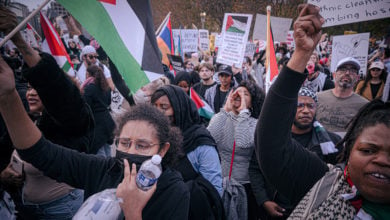The Bush administration is having difficulty building a case for increased aggression against Iran.
Ever since the 1979 revolution, which deprived U.S. corporations of Iranian oil and other resources, regime change
|
The subsequent stages were to be the invasions of Iran and Syria, the other states in the region not controlled by Washington. However, the resistance of the Iraqi people has placed that plan on hold.
The inability of the United States to invade Iran militarily has only meant trying to bring down the Iranian regime through different means, such as an intense propaganda campaign to pressure Iran diplomatically and strangle it economically. But the propaganda campaign has suffered severe setbacks.
In early August, Hamid Karzai, the U.S.-installed leader of Afghanistan, visited the United States. He said, “Iran has been a supporter of Afghanistan, in the peace process that we have and the fight against terror, and the fight against narcotics in Afghanistan. They have contributed steadily to Afghanistan. We have had very, very good, very, very close relations” with Iran.
The next day, in a joint news conference, Bush contradicted Karzai saying that Iran was “not a force for good as far as we can see, they’re a destabilizing influence wherever they are.”
Only a few days later, Nouri al Maliki, the U.S.-puppet leader of Iraq, Iran’s other U.S.-occupied neighbor, made an official visit to Iran. Maliki thanked Iran for its “positive and constructive” work in “providing security and fighting terrorism in Iraq.” Maliki even went so far as meeting with the families of the seven Iranian officials arrested in Iraq by U.S. forces.
Again, Bush promptly took issue with the friendly atmosphere of Maliki’s trip to Iran and said, “if the signal is that Iran is constructive, I will have to have a heart-to-heart with my friend, the prime minister, because I don’t believe they are constructive.”
On Aug. 31, Director General Muhammad El Baradei of the International Atomic Energy Agency reported substantial progress in Iran’s cooperation with the IAEA’s investigation of its nuclear program, calling it a “significant step forward.”
El Baradei said that Iran’s past statements on its plutonium experiment were consistent with the IAEA’s findings and declared the case closed in no uncertain terms: “This issue is therefore considered resolved.”
Imperialism undeterred
Unequivocal statements by Karzai and Maliki citing Iran’s positive role blow a hole in the propaganda line that Iran is the cause of instability in Afghanistan and Iraq. The fact that they are willing to go on record against the wishes of their bosses is an indication of their lack of confidence that following Washington’s dictates will assure the survival of their regimes.
The IAEA report strips the Bush administration of its justification for pushing for further sanctions. Having always maintained that there is no evidence of a nuclear weapons program in Iran, the IAEA is now specifically ruling out a plutonium weapons program.
But while these developments present public relations setbacks for U.S. imperialism, they will not deter it from pursuing further acts of aggression. After all, it is the U.S. occupation forces that rule Iraq and Afghanistan, not the leaders installed by them.
Washington is moving toward designating Iran’s Islamic Revolutionary Guard Corps as a terrorist organization. Because of the Guards’ extensive economic activities, the immediate effect of such a designation would be a further economic blow to the state sector of the economy.
But there are also reports that the Cheney grouping within the Bush administration is advocating a U.S. bombing of the Guards’ bases inside Iran. The terrorist designation may be a prelude to such an attack—an attack that would invoke a reaction from Iran and create the pretext for massive U.S. aerial bombardment.
There is no doubt that Washington will not give up its objective of conquering the resources of the Middle East for U.S. corporations. The lives of U.S. troops are not a consideration, much less the lives of the region’s people.
But if the United States attacks Iran, the Iranian people will resist. Such resistance could trigger a regional uprising against the United States and its client states. It remains to be seen whether the U.S. ruling class will consider the risks of such a high stakes gamble.
The U.S. working class has nothing to gain from the U.S. government’s murderous military adventures, but it has to pay for them with blood.
Struggling against the wars on Iraq and Afghanistan and any attempted expansion of them is in the objective interests of the vast majority of people in the United States.
U.S. out of the Middle East! Hands off Iran!







